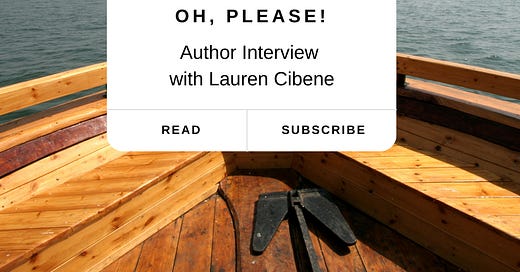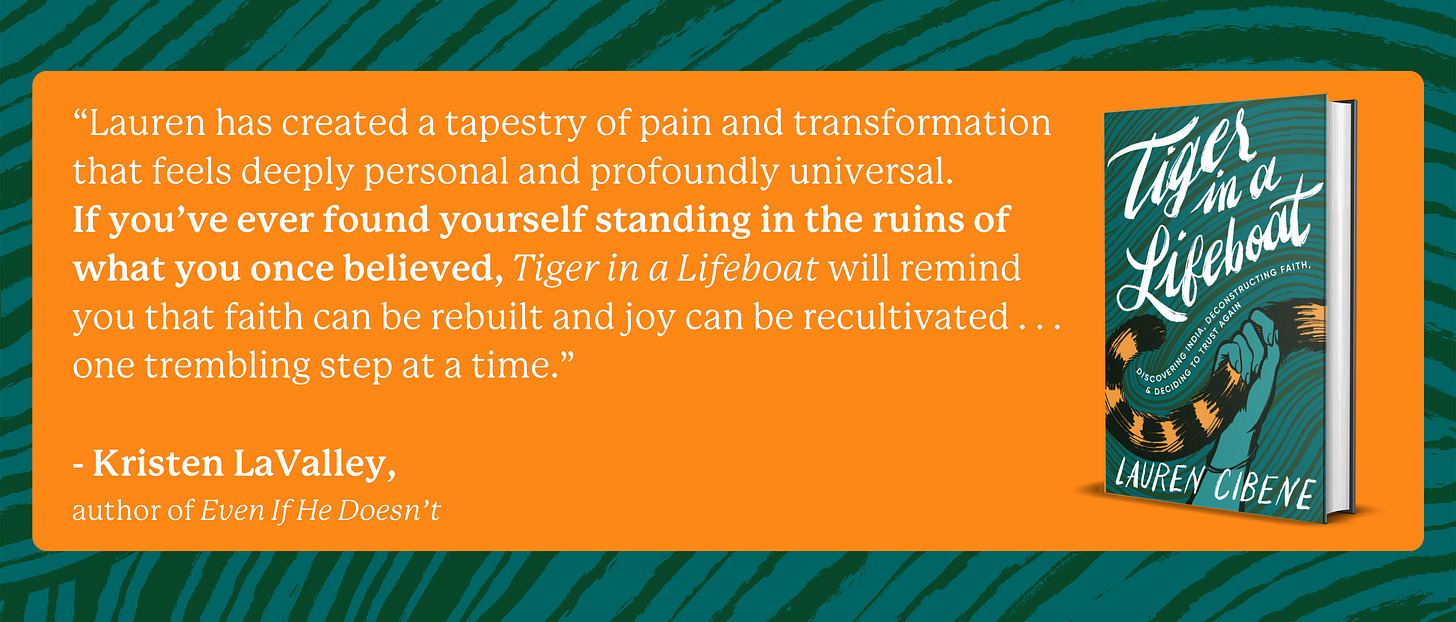Welcome to Oh, Please!—where reformed (or at least reforming) people-pleasers spill the tea on learning to live their own lives without apologizing for breathing. Breaking the habit of putting everyone else first is no joke, and I’m eternally grateful to these brave souls for sharing their journey back to sanity right here at DPP. Trust me, you don’t want to miss this series—subscribe and cheer on these heroes as they finally learn to say “no” without a panic attack!
“We fall into people-pleasing and placating: it’s a survival instinct. However, it’s shortsighted. It feels, in the moment, like it will save us. But eventually it will kill us: spiritually, mentally, emotionally.”
-Lauren Cibene
Happy April Showers, dear reader!
Today’s author interview is special and spiritual and I hope fills your cup the way it filled mine. Lauren’s debut book is coming out this Spring and if its anything like her Substack, we are all going to be in for the sweetest treat.
About her:
Equal parts doubter and believer, Lauren Cibene explores the messy middle of faith, hope, and humanity through writing. Her work embraces life’s big questions with courage and candor, creating space for readers to find their own stories within hers. Her debut memoir, Tiger in a Lifeboat: Discovering India, Deconstruction Faith, and Deciding to Trust Again releases May 6th.
By day, Lauren crafts copy that converts; by night, she pens essays on Substack,
, where thoughtful conversations about faith, creativity, and resilience unfold. Lauren lives in north Georgia with her husband, Tim, and their very spoiled labradoodle, Linus.Welcome to DPP, Lauren! Can you please share when you realized your "yes reflex" was becoming a problem? Where were you, and what was the incident that made you think, “Wait…why am I baking 100 cupcakes for Karen's third cousin's cat’s birthday?”
I never considered myself a people pleaser.
I know hardcore people pleasers and because my life never quite looked like theirs, I thought I was in the clear. Once I got into my late twenties, I realized just how enslaved I was to the opinions of others.
I started receiving therapy after a traumatic experience, and, as so often happens in the therapy room, seemingly unrelated issues started popping up, including my fear of making people angry. This fear forced me to abdicate my convictions and suffocate my spiritual healing so that I would not be thrown out of the conservative, evangelical environments I had always known. And I had to do something about it because my healing was tied up in these sickening, people-pleasing coping skills I had adopted.
In Women Who Run With The Wolves, Ph. D. psychoanalyst, poet, and storykeeper Clarissa Pinkola Estés says that this instinct (she calls it a “too-nice over-adaptation”) often occurs in women when they are “desperately afeared of being disenfranchised or found ‘unnecessary.’” This is why we fall into people-pleasing and placating: it’s a survival instinct. However, it’s shortsighted.
It feels, in the moment, like it will save us. But eventually, it will kill us: spiritually, mentally, and emotionally.
Do you have any Mentors/Gurus/Greek Philosophers who have supported you on your journey? Tell us about them:
Stories. So many stories. I rest, I learn, I grow in stories.
And I think there’s a reason that many of the best-selling stories with female protagonists involve a critical moment when they turn from all they knew, all that was safe, all that was comfortable, and set out on a new, dangerous path. It’s there that they find love and discover their own potential. It’s there that they are freed.
The feminine heart knows, deep down, that the key to its freedom is found when we throw the opinions of others to the wind and run, wild-haired, down the less-beaten path.
This archetypal moment beckons to us, too. Our obsession with enemies-to-lovers romantasies resonates with the small voice inside that longs to see us step into our own heroic arc and discover that the thing we used to fear is, in fact, the very thing that loves us.
How did it feel the first time you said ‘no’ and didn’t follow it up with an apology? Was it like discovering a superpower, or did it make you want to hide under a blanket?
The first time I said, “No.” without an apology or excuse or explanation, I was quitting a toxic job.
I had just sat down with my royal mess of a boss and given her my notice. Three weeks from that day, I would start a new job. But three weeks wasn’t enough for her. She asked me to stay longer, to make my new employer wait another week or two. And I said, “No.” Full stop. I’d never told her no before (which was part of why the job had become so toxic), and the God-honest truth is: I felt sick afterward.
I’ve since learned that this is part of it; this nauseating, second-guess feeling akin to dread is part of the process. It’s not an indicator that I am wrong, or unworthy, or bad. Post-No guilt is evidence that I denied my instincts for so long, and my body needs time to relearn how to follow them again. It will pass like all feelings do, and on the other side, my worth remains.
I’m about to publish my debut memoir, the biggest “No,” I’ve ever conjured. Throughout the writing process, this little book made huge waves in my personal circle. But I’ve kept going because I so adamantly believe that our stories are sacred and they’re meant to be shared…even, and especially, the hard chapters.
It tracks my journey from a place of broken pieces, where I wrestled anxiety, panic, and doubt, to a place of surprising courage, connection, and gilded shards, all against the backdrop of my time in India. It’s out May 6th.
When you feel yourself slipping back into people-pleasing tendencies, what do you do to reset, besides searching Zillow for the cheapest deserted island?
I make a list (three, actually).
I collect all the expectations, priorities, and assignments looming over me, and I sort them into:
Things I need to do
Things I want to do
Things other people want me to do
Then, I complete each list in that order.
It’s not easy, and sometimes when I’m assigning tasks, there’s a tension between putting something on the second and third list. In those moments, I have to get really honest with myself. I have to carefully sieve through my motivations and the perceived expectations of other people.
Using the 5 Whys is helpful here and often looks like this:
I do actually want to make 100 cupcakes for Karen's third cousin's cat’s birthday.
Why?
Because it’s a nice thing to do, and I want Karen to think I’m a nice person.
Why?
Because Karen knows a lot of people and people talk.
Why (does that matter)?
Well, I’m afraid they are talking about me, and I don’t want to be excluded because they think I’m not nice.
Why?
Because I don’t want to be alone.
Why?
Because I don’t know how to be alone with myself.
Ah, there it is. This is tough, but on the other side of this struggle is freedom and so much clarity.
Since you stopped being a professional “yes-person,” what’s been your biggest self-care indulgence (and how much do you love it)?
I revel in my time.
I protect my time with the ferocity of a she-bear because my time is all I have. It’s my wealth, and I indulge in it with lots of reading, writing, and working out (I’m an avid weightlifter). 🏋🏻♀️
If you could give one piece of advice to fellow recovering people pleasers, what would it be (besides faking bad cell reception)?
This is something I’ve started telling myself: stop robbing people of the gift of discomfort.
Discomfort is the fertile ground in which transformation can germinate if we’re curious enough. When we are bothered or annoyed or disturbed, we start asking questions. This can lead to huge personal evolution. It can change the way we vote, parent, speak, think, live. Don’t rob someone of that opportunity by rushing to alleviate the friction of the moment.
This perspective shift can confuse and hijack those lingering people-pleasing tendencies when you start to view saying “No,” as a kindness to them (as well as to yourself).
RAPID-FIRE ROUND:
Kryptonite. What (or who) is yours when it comes to pleasing?
My family. Those family-of-origin ties are strong, and it’s hard to hold boundaries sometimes.
Do you have a favorite Book or TV Show/Film?
Oh, so many! Because it’s on topic, I’m definitely going to recommend The Courage To Be Disliked by Ichiro Kishimi and Fumitake Koga. This is a quick read and has benefited me in so many areas of my life.
Also, again, Women Who Run With The Wolves…highly recommend specifically for the people-pleasing women out there.
Off topic: Of course, I’m currently consumed by Severence on AppleTV+.
Is there anything that you WISHED I ask you, but didn't, that you would like to share here? Final words, advice, questions, comments, concerns? Anything goes.
I’ll leave you with this banger from The Courage To Be Disliked:
“The courage to be happy also includes the courage to be disliked. When you have gained that courage, your interpersonal relationships will all at once change into things of lightness.”
Where can we find you and your work from here?
My Substack;
, boasts the loveliest group of regulars you’ll ever come across, and if you’re into more short-form stuff (including everything from poetry to memes), you can find that on my Instagram: Lauren Cibene.Thank you so much Lauren, for stopping by DPP and for sharing your beautiful self with us here! I am so excited for your book- thank you for writing it!
Readers, Lauren’s book Tiger In A Lifeboat drops on May 6th- if you are interested in a pre-order, or to be part of her Launch Crew, please check out her Substack for deets!
May we not rob anyone the gift of discomfort, especially ourselves,
-K. Alexandra
🐣 P.S. RECOVERING PEOPLE-PLEASERS: If you have walked through fire and have tips to share with the rest of us, I would LOVE to interview you! Please submit your contact information (safely) here: Interview Me! 🐞









Nice work. I’m slowly coming around to the idea that I am a people pleaser. I don’t think of myself that way, but what people think does impact me.
That’s obvious, because it impacts everyone.
But certain people are motivated in that particular way. I don’t think they need to be associated with certain people, like famous people or successful necessarily, but they want people to think good things about them.
It relates to accountability and expectations. That’s how certain personalities are motivated.
😘💕